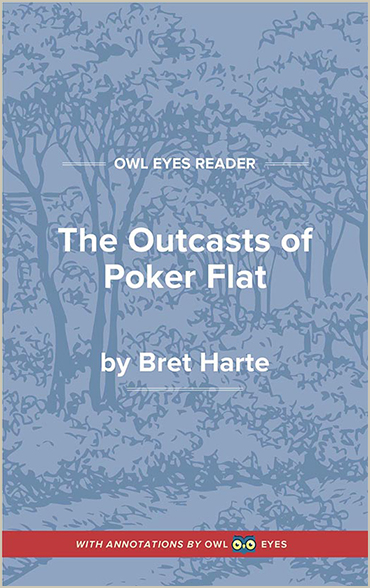Analysis Pages
Character Analysis in The Outcasts of Poker Flat
John Oakhurst: A character of noble qualities, John is exiled not due to his unsavory nature, but out of revenge and spite. When he successfully wins a large amount of money from the leaders of the town, they have him permanently banished. Various instances throughout the story show John to be a character with good moral values. He even insists on returning Tom’s money to him after winning at cards.
The Duchess: The Duchess is a young prostitute with a flair for the dramatic. During the exiles’s journey, The Duchess is melodramatic and theatrical, traits that annoy her fellow traveling companions.
Mother Shipton: Mother Shipton is an older Madame who takes on a maternal role in the group. Mother Shipton later makes the ultimate sacrifice when she secretly starves herself in order to ensure enough food for Piney Woods.
Uncle Billy: Uncle Billy is a drunk scoundrel who steals the exile’s mode of transport and rides up into the hills. Unlike the other exiles, Harte does not give Billy any redeemable qualities.
Tom Stinson: Tom Stinson, or Tom ‘The Innocent,’ demonstrates characteristics that reflect his name. He is described as a virgin who encounters the exiles while traveling with Piney Woods to get married. When Tom loses at cards to John, he has his money returned and receives a warning to never gamble again. His appallingly bad card playing abilities reflect his pure, innocent nature.
Piney Woods: Piney Woods is also painted as an innocent, fifteen-year-old virgin. She is eager to marry Tom, but was forced to run away with him because her father disapproves of their union. She forms a close bond with The Duchess.
Character Analysis Examples in The Outcasts of Poker Flat:
The Outcasts of Poker Flat
🔒"You've starved yourself..." See in text (The Outcasts of Poker Flat)
"He dropped a warning to the Duchess and Mother Shipton, who of course knew the facts of their associate's defection..." See in text (The Outcasts of Poker Flat)
"Temperance House..." See in text (The Outcasts of Poker Flat)
"Piney Woods..." See in text (The Outcasts of Poker Flat)
"made a devoted slave of Tom Simson..." See in text (The Outcasts of Poker Flat)
"the “Innocent” ..." See in text (The Outcasts of Poker Flat)
"The thought of deserting his weaker and more pitiable companions never perhaps occurred to him..." See in text (The Outcasts of Poker Flat)
"anathema..." See in text (The Outcasts of Poker Flat)
"philosophic calmness..." See in text (The Outcasts of Poker Flat)

